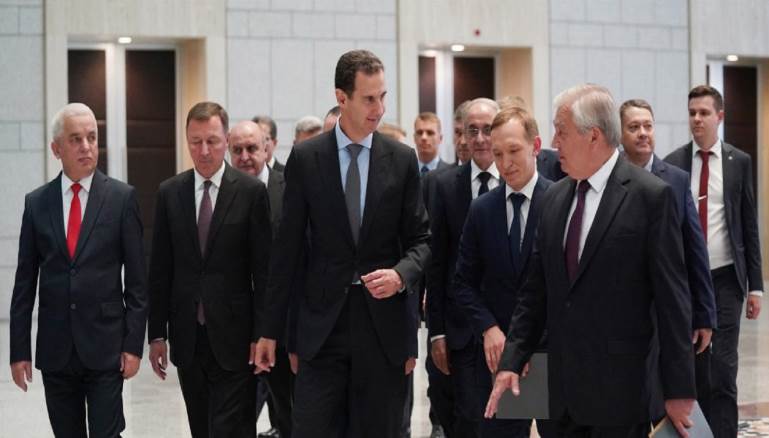A diplomatic delegation or a Russian landing in Syria? On Monday, a Russian delegation arrived in Damascus that is not similar to the previous delegations. This is clear from its 230 members and the Russian Defense Ministry’s announcement that it has arrived “under orders from President Putin and Defense Minister Shoygu.” These factors do not reflect the traditional make-up of diplomatic delegations.
A Russian journalist, who follows regional affairs closely, responded to the delegation’s announcement and size — which includes representation for military figures — by saying: “this is a Russian landing in Syria,” as distinct from a delegation. He added that it is naïve to assume that the delegation is coming only to make progress on solving the problem of displaced Syrians; indeed, the delegation seems to have plenty of messages for Assad.
Read Also: Syria and Russia Talk About Conference on Return of Refugees
Political analyst Rami al-Shaer, who is close to the Russian government, published an article on Russia Today in Arabic, entitled: “Damascus’s slide into delusion begins with a single step.”
Shaer believes that the Syrian authorities are ignoring the fact that they cannot impose their authority in northeastern and northwestern Syria, saying that the issue does not only relate to the presence and military support of the United States or Turkey. Even after the Americans and Turks withdraw from Syrian territory, it is not guaranteed that the central authority in Damascus will be able to control these areas without a settlement based on the UN Security Council resolution, with the participation of all relevant Syrians. The same reality applies to southern Syria, which is in a “very dangerous and explosive situation at all times.”
Shaer said that Assad does not heed the path that Syria has gone down — not only because of: “allies Russia, Iran, and China but also to diplomatic and political efforts with Turkey, the ‘treacherous enemy.’ This path, through the Astana process, has resulted in a cease-fire, calm zones, and starting the work of the mini-constitutional committee, which leaders in Damascus have twisted into a platform for theoretical concepts and verbal definitions.”
This article was translated and edited by The Syrian Observer. The Syrian Observer has not verified the content of this story. Responsibility for the information and views set out in this article lies entirely with the author.


